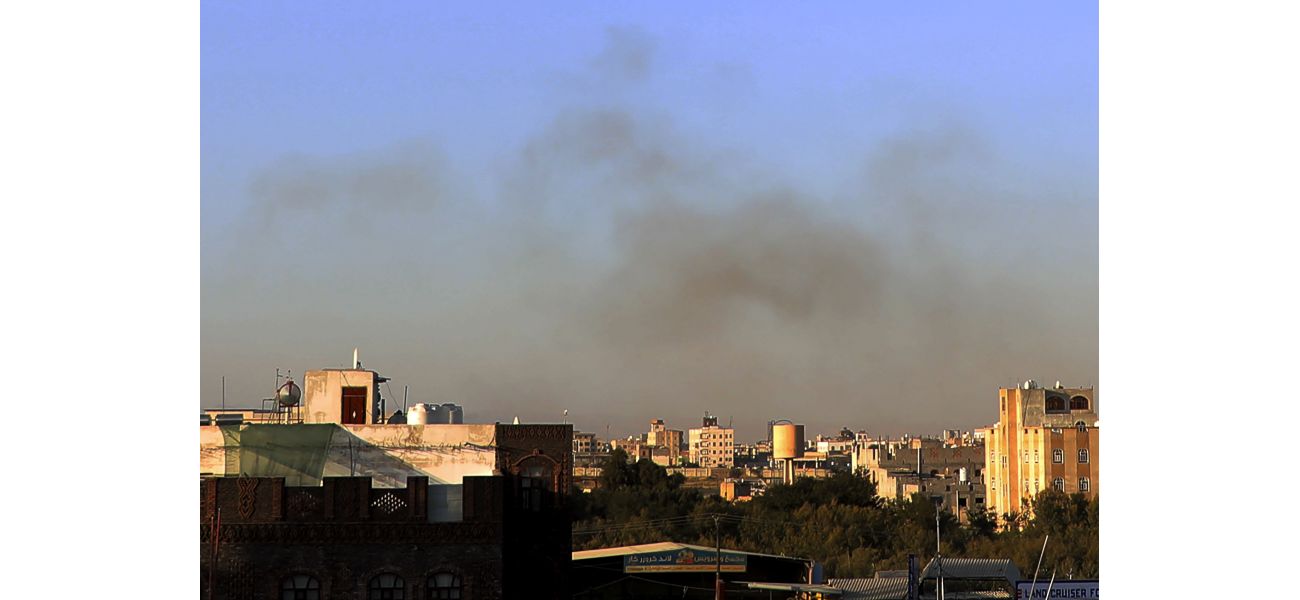Israel bombs Yemen's capital while WHO leader is in the area.
Israeli airstrikes hit Yemen's capital and ports, while the director-general of the World Health Organization was caught nearby and a crew member was injured.
December 27th 2024.

On Thursday, a new series of airstrikes carried out by Israel in Yemen targeted the capital, which is held by the Houthi rebels, as well as multiple ports. This occurred while the director-general of the World Health Organization, Tedros Adhanom Ghebreyesus, was preparing to board a flight in Sanaa. He later shared on social media that the airport was damaged and a crew member was injured in the bombardment.
Ghebreyesus explained that he and his colleagues from the U.N. were safe, but they would have to wait for the airport to be repaired before they could leave. He did not mention who was responsible for the attack. The U.N. spokesperson, Stephanie Tremblay, later confirmed that the injured crew member was part of the U.N. Humanitarian Air Service. Tragically, it was reported that at least three people were killed and many more were injured in the strike at the airport.
Tremblay informed the public that the U.N. team had safely left the airport and were now in Sanaa, while the injured crew member was receiving treatment at a hospital. She also mentioned that an assessment of the damage would be conducted the next day to determine if Ghebreyesus and his team could leave Yemen. The escalation of attacks between Israel and Yemen was condemned by U.N. Secretary-General Antonio Guterres, who described the attacks on Thursday as "especially alarming."
The Israeli army later told the Associated Press that they were not aware that Ghebreyesus or any U.N. delegation was present at the airport in Yemen. The airstrikes were carried out in response to a series of Houthi launches that have been setting off sirens in Israel for the past few days. The Israeli military stated that they targeted infrastructure used by the Iran-backed Houthis at the international airport in Sanaa and ports in Hodeida, Al-Salif, and Ras Qantib. They also targeted power stations, claiming that they were used to smuggle in Iranian weapons and for the entry of senior Iranian officials.
The Israeli military boasted about their capabilities, stating that they can strike very far from their territory with precision, strength, and repetition. These airstrikes, which occurred over 1,000 miles from Jerusalem, came just one day after Israeli Prime Minister Benjamin Netanyahu warned that the Houthis would face consequences for their actions, just like Hamas, Hezbollah, and the Syrian regime have in the past.
The satellite channel al-Masirah, which is controlled by the Houthis, reported multiple deaths and showed footage of broken windows, collapsed ceilings, and bloodstains on the floor and vehicle. Iran's foreign ministry condemned the airstrikes, and the U.S. military has also targeted the Houthis in recent days. The ports that were targeted are crucial entry points for humanitarian aid to reach Yemen, which is known as the poorest Arab nation and has been embroiled in a civil war since 2014.
Over the weekend, 16 people were wounded when a Houthi missile struck a playground in the Israeli city of Tel Aviv, and other missiles and drones have been intercepted. Last week, Israeli jets attacked Sanaa and Hodeida, resulting in the deaths of nine people. This was stated to be a response to previous Houthi attacks. The Houthis have also been targeting shipping on the Red Sea corridor, claiming it is in solidarity with Palestinians in Gaza.
In response to a request from Israel, the U.N. Security Council has called for an emergency meeting on Monday to address the Houthi attacks and Iran's role in supplying them with weapons.
Ghebreyesus explained that he and his colleagues from the U.N. were safe, but they would have to wait for the airport to be repaired before they could leave. He did not mention who was responsible for the attack. The U.N. spokesperson, Stephanie Tremblay, later confirmed that the injured crew member was part of the U.N. Humanitarian Air Service. Tragically, it was reported that at least three people were killed and many more were injured in the strike at the airport.
Tremblay informed the public that the U.N. team had safely left the airport and were now in Sanaa, while the injured crew member was receiving treatment at a hospital. She also mentioned that an assessment of the damage would be conducted the next day to determine if Ghebreyesus and his team could leave Yemen. The escalation of attacks between Israel and Yemen was condemned by U.N. Secretary-General Antonio Guterres, who described the attacks on Thursday as "especially alarming."
The Israeli army later told the Associated Press that they were not aware that Ghebreyesus or any U.N. delegation was present at the airport in Yemen. The airstrikes were carried out in response to a series of Houthi launches that have been setting off sirens in Israel for the past few days. The Israeli military stated that they targeted infrastructure used by the Iran-backed Houthis at the international airport in Sanaa and ports in Hodeida, Al-Salif, and Ras Qantib. They also targeted power stations, claiming that they were used to smuggle in Iranian weapons and for the entry of senior Iranian officials.
The Israeli military boasted about their capabilities, stating that they can strike very far from their territory with precision, strength, and repetition. These airstrikes, which occurred over 1,000 miles from Jerusalem, came just one day after Israeli Prime Minister Benjamin Netanyahu warned that the Houthis would face consequences for their actions, just like Hamas, Hezbollah, and the Syrian regime have in the past.
The satellite channel al-Masirah, which is controlled by the Houthis, reported multiple deaths and showed footage of broken windows, collapsed ceilings, and bloodstains on the floor and vehicle. Iran's foreign ministry condemned the airstrikes, and the U.S. military has also targeted the Houthis in recent days. The ports that were targeted are crucial entry points for humanitarian aid to reach Yemen, which is known as the poorest Arab nation and has been embroiled in a civil war since 2014.
Over the weekend, 16 people were wounded when a Houthi missile struck a playground in the Israeli city of Tel Aviv, and other missiles and drones have been intercepted. Last week, Israeli jets attacked Sanaa and Hodeida, resulting in the deaths of nine people. This was stated to be a response to previous Houthi attacks. The Houthis have also been targeting shipping on the Red Sea corridor, claiming it is in solidarity with Palestinians in Gaza.
In response to a request from Israel, the U.N. Security Council has called for an emergency meeting on Monday to address the Houthi attacks and Iran's role in supplying them with weapons.
[This article has been trending online recently and has been generated with AI. Your feed is customized.]
[Generative AI is experimental.]
0
0
Submit Comment





